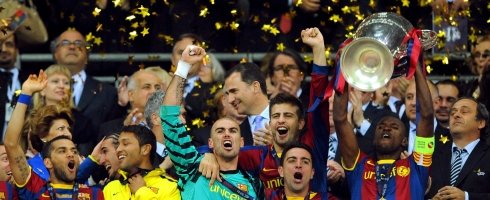Ronald Koeman's powerfully driven free-kick deep into extra time at Wembley flew past Gianluca Pagliuca and delivered Barcelona's first ever European Cup title, breaking the club's seemingly never-ending hoodoo in Europe's premier club competition. It was the Catalans' third European Cup final, but it was their first taste of victory.
In 1961, they had appeared to topple Real Madrid's dominance, dramatically knocking the five-in-a-row winners out in the second round, before falling to Benfica at the final hurdle. Barca possessed the famed Hungarian attacking trio of Kubala, Kocsis and Czibor but it wasn't enough as they lost an enthralling decider 3-2.
They had to wait a further 25 years for their next involvement in the final, and this time surely they had to win it – overwhelming favourites against Steaua Bucharest of Romania, and the game was to be played at Sevilla's Sanchez Pizjuan. It was a Catalan invasion of Andalusia but the match was diabolical and went to penalties after two hours of goalless action. Venables' Barcelona had underperformed during the game and the penalties were remarkable, with Barca thwarted four times by Steaua goalkeeper Helmuth Duckadam, who was later dubbed ‘The Hero of Seville’.
Wembley proved their redemption – and the celebrations lasted not days but weeks in the capital of Catalonia, as they thought that Koeman's thunderbolt against Sampdoria signalled in a power shift in terms of Spanish sides on a European stage. Indeed, three years earlier Barcelona had beaten the same Genoese opposition in the Cup Winners’ Cup final, and in 1991 Barca had narrowly lost the final of the same competition to Manchester United.
Johan Cruyff – then-Barcelona boss and the self-proclaimed creator of 'total football' – brought his Dutch coaching methods to the city where he was adored as a player and this, infused with the natural ability of the Catalans, appeared successful. He was looking to create a dynasty.
Two years after Wembley, Barca made another final and again it was against Italian opposition. This time it was Milan, a star-studded team guided by Fabio Capello but one who were underdogs for the encounter due to their absentees. Star striker Marco van Basten was unavailable through injury, as was young sensation Gianluigi Lentini – at that point the world's most expensive player after his 13m switch from Torino – while defensive pair Alessandro Costacurta and captain Franco Baresi were both missing through suspension.
Barcelona let complacency creep in and paid emphatically. A double from stand-in striker Daniele Massaro put the Rossoneri in command at the break, before early second half strikes from Dejan Savicevic and Marcel Desailly finished the job. 4-0. Humiliation for Cruyff and Barca.
Just when they seemed to swing the pendulum away from Real Madrid – who were going through the leanest patch in their history, without a European Cup in over 30 years – Barcelona had seemingly peaked and would have to regroup. That led to an absence from the showpiece final for 12 more seasons, a delay emphasised by Real Madrid winning on three occasions during this period.
A Ronaldinho-inspired Barca reached the final in Paris in 2006, with Arsenal the opponents. The Londoners were in their first ever final but things started badly for them; German goalkeeper Jens Lehmann sent-off for fouling the onrushing Samuel Eto'o. Bizarrely, Giuly's subsequent goal was disallowed due to the foul. Barca's outrage of being denied what they saw as a legitimate goal turned to fury when a Sol Campbell header put the Gunners 1-0 up at the interval.
Just when it looked like more misery was in store for Barcelona, Eto'o and substitute full-back Juliano Belletti produced two emphatic finishes from tight angles to crown La Blaugrana champions. Another Dutch boss this time was celebrating – Frank Rijkaard.
Barcelona had always been a giant on the global stage, but this process was accelerated with increased income and the club's expert use of the growing global economy, allowing them to build a fearsome squad and a style of football that became synonymous with success.
Spain won three international tournaments back-to-back using the 'tiki-taka' style of play – championed by Barcelona and boss Pep Guardiola, who had never won the European Cup as a player but was part of the side that suffered the chastening 4-0 defeat by AC Milan. He guided them to Champions League crowns in 2009 and 2011, both against Manchester United.
Eto'o and Messi goals were the difference in Rome in 2009 and, while the little Argentine was on the scoresheet again two years later, the gap between the sides had notably grown. 2011 took them back to Wembley, where it had all started for a generation of fans who had seen their side grow from perennial underachievers to a genuine powerhouse.
Each of Barcelona's four victories have had an English connection – two have been at Wembley while three have been against English opposition. That won't be the case against Juventus on Saturday, and they will be wary of their 'favourites' tag following the painful experience of 1994.

